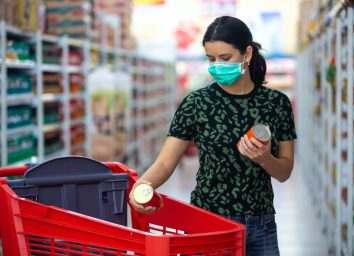Scientists Warn of a New Way Someone Could Infect You with COVID-19 at the Grocery Store

Scientists all over the world are coming to an agreement about a new important characteristic of coronavirus: It’s airborne. What that means is that the virus can stay viable in the air for a significant amount of time, and can infect a person that inhales it.
This is a departure from what we’ve believed is the only way a virus can be transmitted: Through close person-to-person contact, during which droplets from a cough, sneeze, or speaking land on your face, eyes, or mouth.
While the biggest health agencies like the WHO and CDC are only starting to investigate the mounting evidence that coronavirus is airborne, if this proves to be true, we are looking at some significantly greater risks of getting infected in closed spaces and outdoor crowds. New guidelines will likely follow as well.
An airborne virus changes your risk in closed spaces
Viruses either can or can’t survive outside of the human body for a significant amount of time. While we weren’t sure what category the coronavirus fell into, we were treating it as if it’s in the category of viruses that don’t live long outside the human host. However, science suggests the virus may be airborne, which means it can survive outside of the human body in the form of tiny aerosol particles that fill the air and stay there long enough to infect another person.
The tricky part about that is that these tiny aerosol particles are basically invisible to the human eye, and resemble a mist that lingers in the air long after the person that expelled it has left the area.
If coronavirus is airborne, it can also travel farther than six feet. This is especially dangerous in indoor spaces where ventilation is poor and air filtration is non-existent. While we don’t yet fully understand the exact mobility of these aerosol particles that carry the virus, the The New York Times points to new emerging science that suggests coronavirus can travel the length of a room and potentially remain viable for three hours.
Someone could inadvertently infect you at the grocery store
Grocery stores fit the bill of an enclosed space that may not always have ideal ventilation and experience large crowds daily. This means you could contract the virus even if you’re staying six feet away from others. Wearing a mask while grocery shopping is even more important in these circumstances because it could potentially reduce the number of aerosols that people expel through breathing and talking—and protect you from inhaling them.
This new evidence also increases the need for air-filtering systems that would reduce the recirculation of infected air.
Until we know more, wearing a face mask in enclosed spaces is your best bet in protecting yourself. Don’t forget to sign up for our newsletter to get the latest coronavirus news delivered straight to your inbox.








